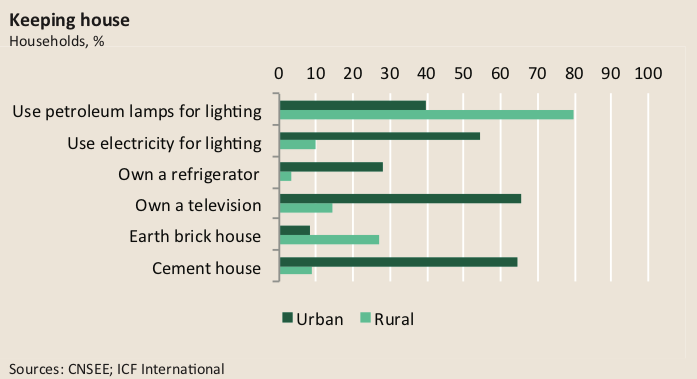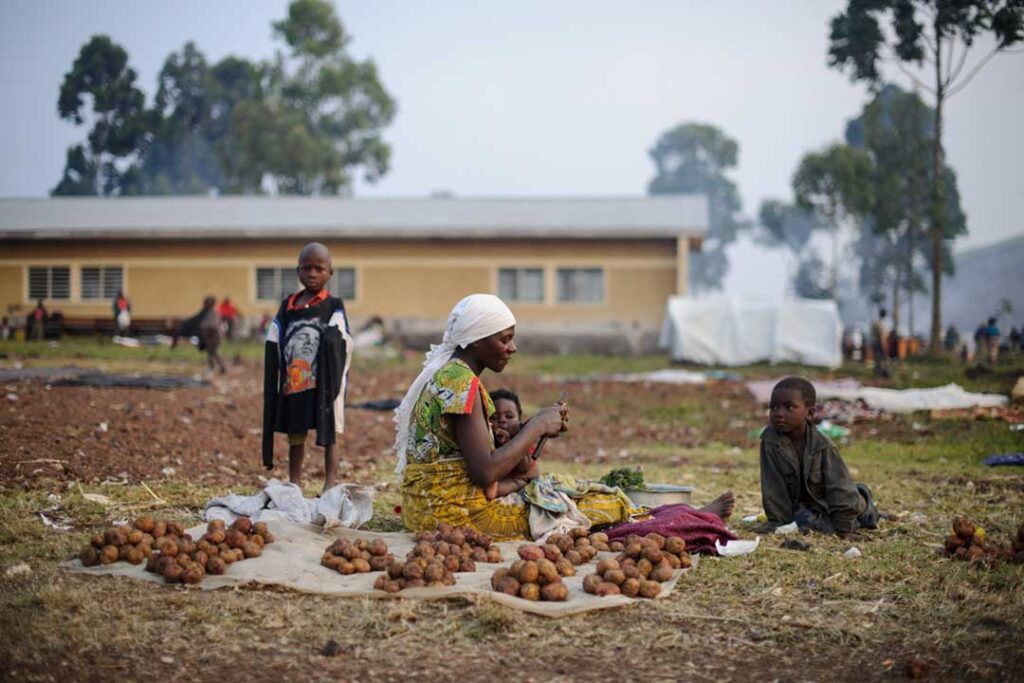Republic of Congo’s tiny middle
Everyone is poor in this small oil-producing country; the middle class are less so
Casimir Yoka sits on a plastic lawn chair outside his home in Pointe-Noire, Republic of Congo’s economic capital on the South Atlantic Ocean. The 52-year-old stock manager works at the nearby port and makes no apologies for the small tumbler of whisky that sits at his feet. It is Sunday, his day off.
In the corner of his sandy courtyard, which has been fenced off with sheets of scrap metal, Mr Yoka’s wife scrubs some plastic dishes in a bucket, left over from this morning’s breakfast. Inside, their 17-year-old daughter is watching French-dubbed MTV on their flat-screen TV. The refrain of Iggy Azalea’s “Fancy” is just audible over the clamour of the small gas generator that powers the television and satellite dish.
“Is this middle class?” Mr Yoka asks, gesturing at his single-story, unpainted, cement-block house, which has neither running water nor electricity. “In Congo, we say that we have two classes: the rich and the poor,” he says. “And here, almost everyone is poor. But then, within the poor, you have those that are more poor and those that are less poor.”
He pauses to pull a ringing smartphone from his pocket.
“I’d say my family is within the upper part of the poor—so essentially middle class, if you must divide it as such,” Mr Yoka continues, silencing the phone. “We are far from being rich, but we have all the necessities. We don’t suffer for much, but we also don’t have much.”
While the concept of an emerging middle class, and the debate over who belongs to it, is one that is relatively new to many Congolese, economists say the middle class across Africa has been on the rise for more than two decades. A 2011 African Development Bank (ADB) report defined the middle class as anyone who spends between $2 and $20 a day. Africa’s middle class now comprises about 34% of the continent’s population, or 327m people, up from 27% in 2000, according to the report.
“Sustained growth over the last 20 years, particularly within the last decade, has led to rapid growth in the middle class,” said Francisco Ferreira, the World Bank’s chief economist for the Africa region during an interview with Africa in Fact. “However, the middle class in most African countries is still relatively small and concentrated. It’s true that most African economies have been growing fast, but they are still quite poor.”
In Africa, for example, 60% of the middle class belongs to what is called the “floating class”: those individuals who survive spending $2 and $4 per day, and are quite vulnerable to sliding back into poverty, according to the ADB report.
The report found that an estimated 31.4% of the Congo Republic’s 4.5m people fall into their wide definition of the middle class. When the floating class is removed from this count, however, just 8.8% of Congolese are considered middle class. Nearly half of the population still lives on less than $1.25 per day, according to the World Bank.
Salaries do not determine class, said Leonce Paka Ndembi, 56, a health care assistant in Pointe-Noire, because purchasing power can vary greatly depending on family size and other factors. A better definition of class is provided by opportunities or possessions one owns compared to others.
The “more-wealthy poor” usually have a modest home built from nice wood or cement, as opposed to mud and straw, he explained. They are more likely to live in an urban area, to take taxis as opposed to buses. Their children have a better chance of going to a private school and continuing on to university. Clothes are bought new, not second-hand. They might also have more durable or high-tech goods, such as a refrigerator or TV, but are unlikely to own a car or have air-conditioning.

“But even those lines are blurred, because now that we import so many cheap Chinese goods, items that were once only luxury can now also belong to this so-called middle class or even the very poor,” Mr Ndembi said.
Taking this notion of class into account, a 2011-2012 demographic and health survey by the government’s National Center for Statistics and Economic Studies (CNSEE) measured class size by indexing a household’s overall “well-being” based on factors such material possessions, access to electricity and the number of people who share a single bed. They found that approximately 27% of the urban population is middle class compared to under 7% in rural areas.
CNSEE reports that while more than three-quarters of Congolese now have access to potable water, only 22.6% have water sources within their parcel of land and just 3.5% have running water in their homes. The share of homes connected to the electric grid has risen from 34% in 2005 to 42% in 2011, says CNSEE, but only 7.1% of the country’s roads have been paved, according to the World Bank.
“The quality of life has definitely improved for many Congolese over the last ten years,” said Francois Loubayi, 42, who earns around $11 a day for his work at the mayor’s office in Pointe-Noire. He credits the government’s reforms, introduced after the country’s 1997-1999 civil war, aimed at improving living conditions, reducing unemployment and lowering poverty levels by 2015.
“Health systems and education systems have gotten better,” Mr Loubayi said. “But many people still lack access to the basic necessities that often define anyone above the level of poor. The infrastructure is still weak. So is that a sign of a growing middle class?” he asks. “I don’t know.”
Pointe-Noire is the centre of the country’s oil industry and a major contributor to Congo’s estimated crude oil production of 290,000 barrels per day, according to the CIA World Factbook. It is home to the nation’s highest proportion of middle class families: 28.2%, according to the CNSEE.
While oil does not necessarily make people wealthy, the World Bank’s Mr Ferreira said, it can give some people the boost they need to move up in society. “Firms that contribute a lot to GDP but employ relatively few people, like those in the natural resource sector, are not going to be moving many people into the middle class,” he said. “They will move some, and sometimes even above the middle class into the elite, but they are not going to be as powerful as investments in manufacturing and services would be.”
Locals agree, for the most part, but also realise that oil industry jobs, such as working in the refineries or on offshore oil rigs, are much needed.
“The petroleum…has given many people the chance to earn an honest living,” said Rafael Kiiabiya, 62, who worked for the state as a topographer for more than 25 years before his retirement in 2007. “The work is hard and you don’t usually earn much. The foreigners and the elite are the ones who really profit from it. But sometimes it’s just enough to leave poverty behind.”
Moving up to the middle class is a steep climb, often up a greasy pole—especially for youth.
“One reason why the rich get richer and the poor get poorer in Congo is nepotism,” said Gaston Okombi, 27, a Brazzaville resident who remains unemployed after earning his master’s degree in finance more than a year ago. “To have money, you have to be close to power. Even if a poor student studies hard and excels better than all his classmates, if he doesn’t know anyone in a position of influence, he will remain poor,” he said. “So you see, in our country it’s not the fruits of your labour that bring you wealth. Nepotism really blocks certain classes from rising.”
In contrast, Mr Yoka remains optimistic: “I have confidence that my kids will succeed and that they will do even more than me because they have more opportunities than I ever had,” he said, savouring the last sip of his whisky. “But they will also need to put in the effort. You can’t just sit back with your arms crossed and wait. You need [to] have ambition and creativity. You need to make a change. Because a change is what will raise your status.”



